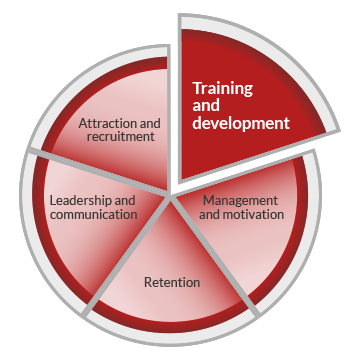The training and development of your workforce is an important part of the workforce development cycle, and is integral to the success of your business. A wide range of training options are available. Some types of training, such as induction, first aid and workplace safety, are essential, depending on your workplace.
Your local Jobs and Skills Centre can provide advice on options for the training and development of your employees, and information is also available in the Training for employers and business section of this website.
In addition, there may be funding support available from the State or Australian Government for training your employees.
Identifying training needs
Training is the process of gaining skills (competencies) and knowledge to perform an activity effectively. Training usually has a practical focus.
Rarely does someone walk into a job with all the skills, knowledge and attributes required to do their work to an optimum level from day one. Often there is a requirement for some form of training or knowledge development. Training and development is also useful to up-skill your existing employees into higher positions or to take on different roles in your business.
Training needs analysis
Training is an investment in your business and can lead to increased productivity, enthusiastic staff, higher morale, increased profit and a positive business reputation.
You will need to determine what training employees need, particularly new employees, to ensure that they are able to complete the work you need them to do. This process is commonly referred to as a training needs analysis (TNA).
A TNA will help you to identify what training might be required to bridge the gap between an employee’s current skill level and the skill level that you need them to have. To make sure your training investment is properly targeted, consider:
- the role of each staff member and what you want them to achieve and contribute to your business; and
- whether each staff member has the skills and knowledge to do what you need them to do. If not, identify what skills or knowledge they need and put in place training in these areas to up skill them.
To help you identify skills gaps and where training might be required for current and future staff, use the Training needs analysis template. A TNA can be applied right across your business, from individual staff members to whole departments.
Team training plan
A team training plan will help to record and keep track of the training that your employees are doing. To see how it’s done, check out the Team training plan template.
Training solutions for employers and business
In today’s ever-changing business world it’s important to have a skilled workforce that can learn and grow with you, and adapt to both challenges and opportunities. A smart employer knows that a focus on their people is just as important as a focus on finance or any other aspect of the business.
Vocational education and training (VET) – whether that's taking on an apprentice or trainee, upskilling your existing workforce or undertaking specialised training in new technologies or processes – can take your business forward to its next level of success. Keeping your team up to date with the latest skills and knowledge will not only keep operations moving forward and increase productivity but it can also improve employee engagement, leading to better retention of staff.
Whatever your requirements, your local Jobs and Skills Centre can offer advice and information about the ways that training can give your business a competitive edge and engage your workforce.
Developing your existing employees
Developing your existing employees is a possible alternative to recruiting new staff. Some advantages of doing this include:
- skills and knowledge are developed when you need them and can be taught and assessed in the workplace;
- you can tailor the learning of individual employees to meet the needs of your business – now and into the future;
- learning can occur over a period of time so that skills are developed and used to coincide with your business’ needs and cycles; and
- training or professional development is seen favourably by employees and can assist in creating a career path for valuable employees.
More information on training options for developing your workforce is available from your local Jobs and Skills Centre.
The Chamber of Commerce and Industry (CCI) offers customised training programs for employers and the Small Business Development Corporation offers workshops which can benefit employers.
To maintain a competitive edge, registered training organisations (RTOs) recognise that employers may need to train their staff to develop new skills, or they may need to be re-skilled in the use of new technologies and processes. RTOs can provide diverse and tailored solutions to help you address the specific training needs of your business.
Registered training organisations (RTOs) provide training solutions across a wide range of industries. They can work directly with your business to design tailor made training solutions that are aligned to meet your specific training needs. This customised training can be delivered in your workplace to minimise disruption to your business operations.
More information on training options for developing your workforce is available from your local Jobs and Skills Centre.
The Chamber of Commerce and Industry (CCI) also offers customised training programs for employers, and the Small Business Development Corporation offers workshops which can also benefit employers.
Recognition of prior learning (RPL) can help your employees gain formal recognition for the skills and knowledge they may already have.
RPL is an assessment process that assesses the skills and knowledge your staff have obtained through their work experience, studies and life experiences. The assessment process determines the extent to which the employee has achieved the required competencies of a qualification. RPL can be granted for partial or total completion of a qualification. Employees may be assessed at the workplace ensuring minimum disruption for employers and business operations.
Your local Jobs and Skills Centre can assist with information about RPL options for your business.
Employing an apprentice or trainee can help you to develop the skills of your workforce and could be the smartest decision you make.
Apprenticeships/traineeships combine practical experience at work with structured training. Apprenticeships generally include traditional technical trades such as bricklaying and cabinet making. Traineeships are usually in non-trade areas such as hospitality, business and health. Both are available to people of all ages. Most can be undertaken on a full-time or part-time basis and many can be started at school. At the same time, incentives for employers have increased and training is more flexible.
The Australian Apprenticeship Support Network (AASN) providers, contracted by the Australian Government, help employers navigate through apprenticeship arrangements and ensure apprentices get the support they need to complete their training.
The Department of Training and Workforce Development's Apprenticeship Office administers training contracts and regulates the apprenticeship system in Western Australia.
Pre-apprenticeships and pre-traineeships provide a pathway into a full apprenticeship or traineeship, further training, or employment. They are at a Certificate II level, and combine formal training with a mandatory work practice or placement component.
To find out more about pre-apprenticeships and pre-traineeships, you can view the business rules on the Department of Training and Workforce Development website.
- View the business rules here
- You can also view a full list of all pre-apprenticeships here
- A list of pre-apprenticeships for secondary school students is available here
There is also a Guide to establishing a pre-apprenticeship course available, if this is an option you would like to pursue.
GTOs employ apprentices and trainees and hire them to other businesses, who become a host employer, giving you the all the benefits of having an apprentice or trainee without being the actual employer.
To find out more about what group training organisation can offer, see our GTOs section below.
You can also visit your local Jobs and Skills Centre for advice and assistance about group training organisations.
Whatever your training requirements, RTOs are well placed to design, develop and deliver a wide range of training solutions specifically for your business. The training they can provide is flexible and there are increased financial incentives for employers and allowances for individuals that make these type of ‘on the job' training solutions attractive to both parties. RTOs are regulated by national standards, against which they are audited regularly, and are recognised by State regulators.
If you would like to discuss your training requirements with your preferred training provider, contact your local TAFE or private registered training organisation.
If you want to access government funding you must engage a registered training organisation. RTOs are the only training providers able to issue nationally recognised qualifications and statements of attainment.
Group training organisations
Perhaps your business would benefit from having an apprentice or trainee, but you may not have capacity to employ one because you:
- are unable to offer an apprentice or trainee a permanent position or guarantee ongoing work for the duration of the apprenticeship or traineeship;
- might not have the range of work available to ensure that the apprentice or trainee gains all the necessary job skills for their qualification; or
- don’t have the time to undertake all the employment and on-the-job training responsibilities that are required.
Group training organisations (GTOs) can assist. GTOs employ apprentices and trainees and hire them to other businesses, referred to as host employers, while they undertake their training. Some specialise in a particular industry, while others may cater for an entire region and cover many industries.
As the primary employer, the GTO:
- selects the apprentice or trainee;
- manages and monitors the on and off the job training, including the training contract;
- is responsible for all paperwork related to wages and allowances, superannuation, workers’ compensation, sick or holiday pay etc; and
- issues uniforms, tools, PPE etc as required.
With a GTO, you’re not locked into a long term arrangement – you can change and move your arrangements for hosting the apprentice or trainee as and when required to suit your business needs. You pay only for the actual hours worked, and do not have to manage all the administration tasks. You can even access apprentices and trainees at different experience levels, right up to experienced fourth year apprentices.
To find out more, contact a GTO in your industry area or talk to your local Jobs and Skills Centre.
Establishing a GTO in WA
The GTO registration process comprises of an initial information session with the entity seeking to consider becoming a GTO, to discuss the business planning to be undertaken and demonstrating compliance with the National Standards for Group Training Organisations 2017.
Further details are provided in our fact sheet.
For more information on group training, and a copy of the national standards and related evidence guide, please visit the Australian Apprenticeships website.
Financial incentives for employers
There is a range of financial incentives to help businesses with the cost of taking on a new employee, apprentice or trainee. Incentives are provided by the Western Australian and Commonwealth Governments.
Multiple incentives can apply, so it is important to contact the agency providing the incentive to discuss your situation.
For information on all incentives available to employers, please browse through the Incentives to employ and train section of this website.
Where you can go for help
These organisations all provide support and guidance to businesses.
The Department of Training and Workforce Development provides funding for the operation of industry training councils (ITCs) in Western Australia to:
- provide a leadership role in promoting their industry;
- provide high level, strategic information and advice that informs the State Training Board on the training needs and priorities of industry in WA;
- market intelligence on skills supply and demand, in particular, current or emerging skills shortages and recommends training strategies to support industry's skills development needs; and
- prepare industry workforce development plans.
ITCs provide a valuable contribution towards the preparation of the State's training profile and the vocational and education and training system funding priorities, and receive a wide range of input from key stakeholder representatives including peak employer, employee, and industry organisations.
The Commonwealth Government has established Skills Councils and committees to advise, support and make decisions to progress skills and training matters.
Further information is available here: dewr.gov.au/skills-and-training/skills-councils-and-committees.
The Chamber of Commerce and Industry of Western Australia (Inc) (CCIWA) is a not-for-profit, member driven organisation that provides information, professional services and support for business.
Visit the CCIWA website for a full range of training and services available to support your business.
The Small Business Development Corporation (SBDC) is a Western Australian State Government agency focused on the development of the small business sector. It strives to:
- improve the skills and knowledge base of the small business sector;
- take a leading role in influencing the policy and regulatory environment for small business;
- facilitate regional small business development;
- drive small business growth;
- stimulate a culture of enterprise, and celebrate the success of small business; and
- sustain a culture of achievement and leadership in small business development.
For additional information about how the SBDC may be able to assist your business go to smallbusiness.wa.gov.au.
Induction
Induction, also known as orientation, is the process of introducing new employees to the business, the working environment, management and other employees.
Although an induction is generally intended for new employees, it can also be useful for existing employees who move into another position or another area within your business to give them all the information they need.
Benefits of induction
There are two key benefits your business can gain from good induction processes:
- reduction in staff turnover – reducing the likelihood that new staff will leave your business shortly after commencing employment; and
- increased productivity – a proper induction will allow new employees to be productive more quickly by giving them all the information they need upfront to get up and running in their new position.
How long should induction take?
A thorough induction may take anywhere from several hours to several days to complete. You can spread the induction over a couple of days or weeks if there is no risk to the person in regard to occupational hazards. This allows the employee to gradually learn all that they need, while becoming familiar with the new work environment. Induction is not considered complete until the new employee has sufficient information to be productive to an acceptable level.
It may be useful to think in terms of what information is required in the first day, first week and first month.
Induction needs of different groups
We know that customers have their own needs and we modify our products or services to meet those needs. The same should apply to our employees. New employees come from all walks of life and may have differing needs when it comes to feeling comfortable in the workplace during those first few months. The particular needs of certain groups of employees should always be considered.
The Induction checklist can be used to help you plan how you will induct new staff and what to include in induction programs.
School leavers typically have limited work experience and tend to be unfamiliar with the demands and habits of a workplace. They may need more support, greater detail regarding their responsibilities and obligations and may need a greater level of supervision for the first few months.
It may also be the first time they have worked according to particular policies and procedures and they may need to spend extra time on the relevance of these in the workplace.
Graduates include university graduates and those graduating from higher education institutions. Graduates are likely to be enthusiastic about entering the workforce and eager to apply their theoretical knowledge in a practical manner. To take advantage of this enthusiasm, explain how the theory may be applied to practice.
You may find it best to involve graduates in projects where their expertise can be used and where they can feel they have made a contribution to your business. Encouraging them to share their up-to-date theories and strategies will make the graduate feel like a valued member of your business.
Much like school leavers, this group may need additional support, particularly if they have had limited work experience.
This group may have substantial work experience so their induction should focus on filling their skill and knowledge gaps. Being over-supervised may have a detrimental effect on members of this group.
The induction period can be a good time for you to identify skills and information this person has that can help your business to become more productive and competitive.
Australian and State government legislation prohibits discrimination against people with disabilities, ethnic/social minorities, people with caring responsibilities, and those from a non-English speaking background.
Reasonable adjustments may need to be made to accommodate newly employed people from these groups. Think ahead about any modifications to the physical environment, rosters, work practices and processes that may be necessary. For example, can the office accommodate wheelchairs? Can the phone system accommodate aids to hearing? Does the roster need to be more flexible for those with caring responsibilities? Is there a quiet place for people who need time for prayer?
It is important that these types of things are considered before the new employee starts work.
Existing employees commencing new roles are often forgotten when it comes to induction. An induction for an existing employee can be a valuable process and will increase the likelihood of this person feeling comfortable in his or her new role. This is particularly true for employees moving to new areas of your business and those who have been promoted.
Duty of care
It is important to address your duty of care in the induction process. Each person has a duty to ensure their action, or failure to take action, does not harm others. It is part of the occupational health and safety responsibilities and obligations for employers and employees. It is the employer’s responsibility to ensure that employees are safe in the workplace.
As an employer, your duty of care extends to ensuring that your employees (new and long standing) are aware of:
- any risks to their health and safety;
- the procedures that are in place to ensure they do not suffer injury or illness while at work; and
- any instructions and relevant protective equipment that is are provided.
New employees are most at risk of being injured, primarily due to a lack of experience or familiarity with your workplace and processes. Ensure that you or experienced staff members provide proper training and supervise the new employee until you are confident that they are competent enough to be left unattended or unsupervised.
Make sure that your employees have the required experience or are familiar with safety procedures even if they have worked in similar jobs or workplaces.
It is important to inform all employees about the health and safety requirements in your workplace. For information about your occupational health and safety obligations and requirements contact Worksafe WA on 1300 307 877 or commerce.wa.gov.au/worksafe.

Further information
Your local Jobs and Skills Centre is a one stop shop for assistance with training and development for your workforce.
| You can also find useful information in the Training for employers and business section of this website. |









